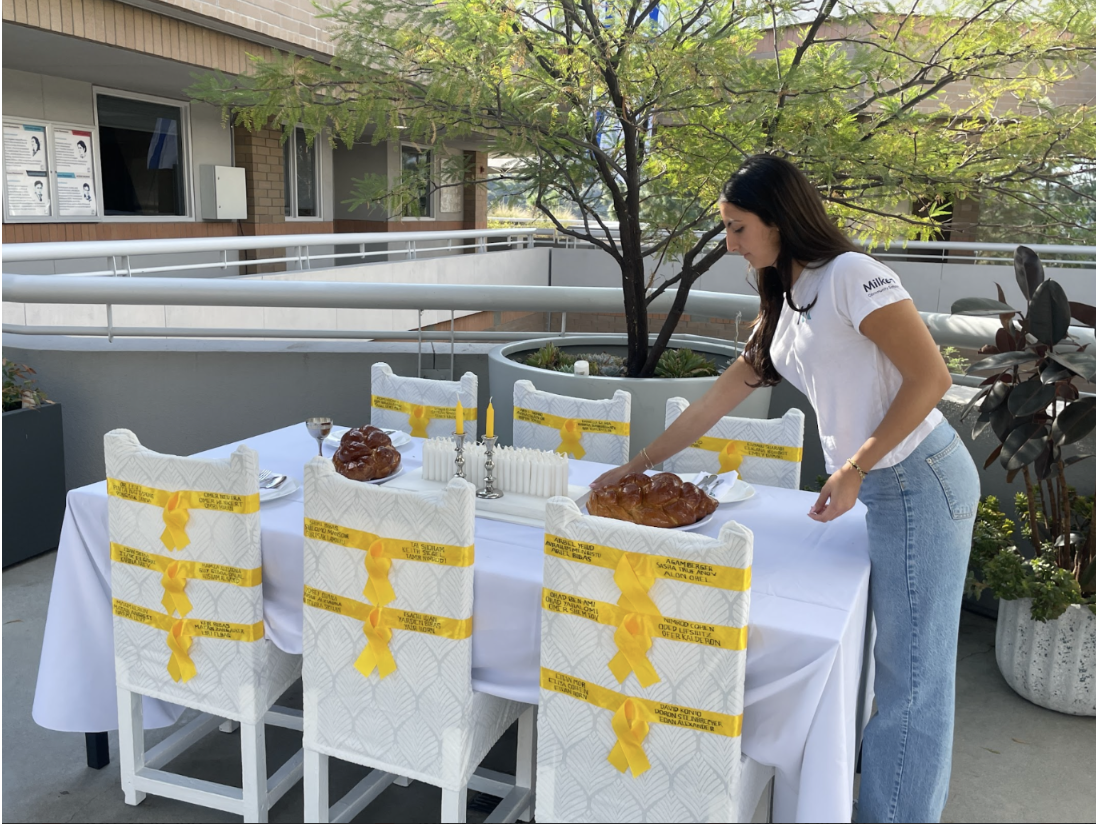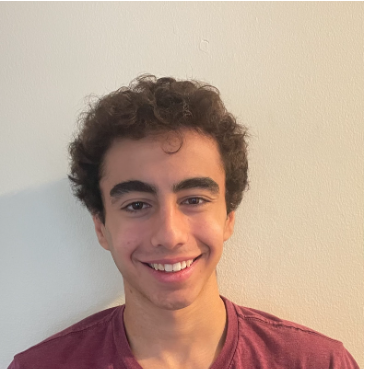On October 7th, 2023, 29-year-old Maya Izoutcheev worked as a bouncer at the Nova Music Festival in southern Israel. She contributed to an event whose organizers had planned to foster love, connection, and a sense of belonging within a young peaceful group who came to simply have fun. During Maya’s shift, though, the music stopped, leaving her startled, as she “knew how expensive those speakers were.” Yet silence was not felt at the once joyful festival. The song, laughter, and love in the air gave way to sirens, rocket fire, and the screams of the dying, raped, and mutilated victims.
At 6:29 AM, the radical Hamas terrorist group launched a surprise invasion on Israel from Gaza and attacked the music festival’s participants and the many Israeli communities, Kibbutzim, and cities in its close vicinity. Maya escaped with her friend Sagi Gabay, 28, and they drove to a bomb shelter in the area by then filled with 40-50 other people. As they heard the sound of gunfire quickly approaching the shelter, Sagi managed to convince Maya to leave the area with him. They returned to their car, narrowly escaping the Hamas terrorists in the area. Later, they both had to exit the vehicle due to attacks taking place on main roads and “ran for their lives in the Negev Desert” avoiding gunfire wherever they heard it. Finally, they found a man who agreed to drive them to nearby Kibbutz Patish, a town that was safe from the Hamas onslaught.
Maya and Sagi escaped. Many others did not. Hamas terrorists murdered approximately 400 people at the Nova Festival and 800 more in the many towns and cities near the Israeli border with Gaza. At the same time, they took 250 people hostages. More than a 100 of them remain in Gaza today. The murder, rape, beheadings, arson, and kidnapping were atrocities Israelies have never experienced to such an extreme degree. To only add to the horror, on October 8th, the Hezbollah terrorist group in Lebanon began firing missiles and drones towards the Israeli cities close to the border. These daily attacks have forced 70,000 Israeli citizens to flee their homes in Northern Israel. Israel has been fighting a war in Gaza against Hamas since October 7th 2023 and also began ground operations against Hezbollah in Lebanon in October of 2024.
Milken students were able to meet the Nova survivor Maya when grades 11-12 took a trip to the Nova Exhibition, which recreates aspects of the attacks of October 7th and shares more personal stories from the victims. Students left in shock as they read, saw, and heard about the intense atrocities that the exhibit highlighted.
Noa Foruzanfar (‘25) said “You get the experience as if you were at the festival[‘s aftermath].” As she looked at the shoes, ones also commonly worn at Milken, that belonged to some of the victims, she realized, “it literally could have been us.”
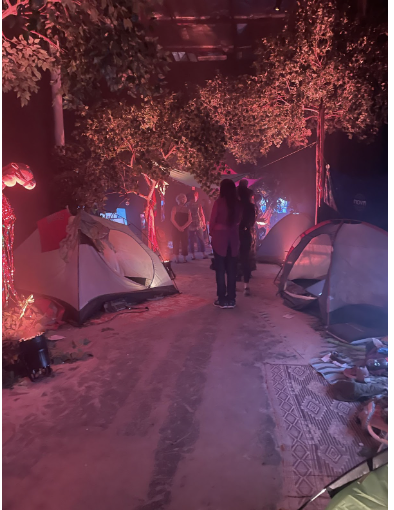
The Nova Festival survivor Maya spoke to a large group of students that day and shared her powerful survival experience. Daniel DeBasc (‘26) said that Maya was able to “hit you with it [her story] and make you feel it the way she did” but that students did not leave with an overwhelming sense of negativity but rather of solidarity and hope.
Though Maya’s story is an extremely traumatic one, she brought a sense of serenity and love to a group of students shaken by the difficult exhibition they had explored moments earlier.
Exactly one year after 10/7, Milken commemorated in countless ways all over campus those lost and still held in captivity. A grade 6-12 all-school assembly took place and included three stories of those murdered in Israel one year earlier, a Kol Echad performance of the Eurovision song “Hurricane”, and a speech from Dr. Shulkind that honored those connected to the Milken Community lost on October 7th.
Additionally, Israel Programs Coordinator Isabella Vom Steeg organized an exhibition in the theater that honored all of those killed and held hostage. Various classes visited that exhibition throughout the entire day. Julia Refoua (‘28) created a large interactive art piece in the main Milken entrance area, featuring a yellow hostage ribbon that students filled with orange candles. Also, a Shabbat Table with chairs that were wrapped with yellow tape with the names of the hostages was created to represent the absence of those still held in Gaza. All over campus, students held “lunch and learns” to continue educating community members on the conflict and to help them process the emotions that this difficult day presented.
Head of Israeli studies Mr. Meyerson stated that Milken was already searching for ways to “increase, improve, and elevate our level of Israel education” before October 7th but that the attacks only motivated them more.
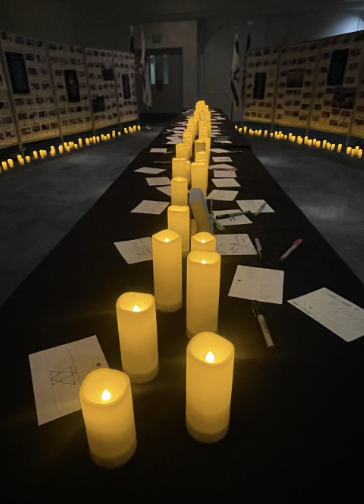
For example, Milken has planned three new trips to Israel for grades 8, 10, and 12 and has also created new Israel education curricula and seminars for the middle school.
Also, the school has brought and will be bringing many influential Jewish speakers to campus including but not limited to former Israel Prime Minister Naftali Bennett, who spoke about his time as head of state in Israel and his advice to Milken students, Israeli Eurovision contestant Eden Golan, who performed the song “Hurricane” and spoke about her experiences facing antisemitism while on the literal and figurative global stage, and a Milken alumnus and veteran who had served in Iraq and Afghanistan. IDF soldiers who have sustained wounds will also be meeting students later this year to discuss their experience fighting for Israel and the importance of defending the nation from terror.
As a result of Milken’s Israeli education efforts and the many challenges Jews have faced in the past year, Milken students have felt more connected to Israel and have made a bigger effort to learn about the country’s history than ever before. Daniel DeBasc (‘26) described a new “genuine interest” in Israel among students and has viewed some of his peers who “were disconnected from Israel before the war and all of a sudden now cite information and articulate arguments” relating to Israel. He added that he can tell students have invested “time and energy into learning and actually caring.”
Students all over campus have joined Masa Israel and the Israel Leadership circle, both of which dedicate their meetings to discussing issues relating to Israel and finding ways to support the country both on campus and in the world.
However, since the 10/7 massacre much of the worldwide Jewish community feels changed and scarred.
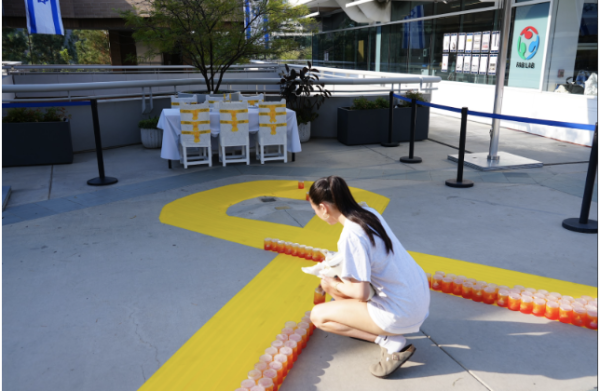
Milken’s Hebrew Instructional Leader Dr. Carmit Burstyn lost her cousin, who served as an IDF soldier near the border with Gaza, on October 7th . Dr. Burstyn says that since 10/7, the worldwide Jewish community has become “way more united” and “did tikkun olam [transliteration of “repairing the world” in Hebrew] for Israel.” She pointed out that “people from all over the world gathered clothes and sent donations” for those directly affected by October 7th’s attacks and tragedies and that “it was beautiful to see how we as a Jewish community come together at a time of need.”
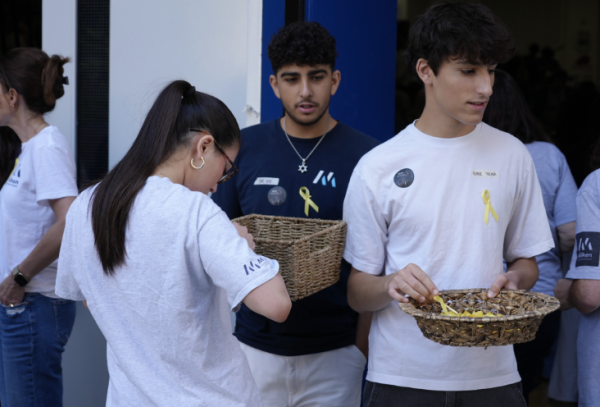
Mr. Meyerson agreed that after October 7th, Diasporic Jews and Israelis showed real unity and cared for one another in any way they could. Though he stated that in Israeli society, “over the months since that time, that unity has eroded” and “many have lost their trust in the government.” Mr. Meyerson added that these divides became most evident when “families of hostages protesting for a return of those taken are being physically attacked by supporters of the government.” The large majority of Israel staunchly supports the IDF’s battle against terrorism, but that doesn’t mean that intense divides regarding the conflict do not exist.
Nova survivor Maya has also expressed that thinking about the hostages daily has become a painful and cruelly normalized part of Israeli existence.
She hoped that in the weeks following October 7th, “the world [would] stand with us” and “help us release our hostages” but that “when it did not happen, it [knowing the hostages remained in Hamas’ hold] became our reality.”
Despite all the hardship the Jewish community currently faces, including a terrifying pogrom against Israeli soccer fans in Amsterdam early November, Israelis and Jews the globe over must continue to proudly shine their identity and remain relentless in their fight against antisemitism and anti-Zionism.
For the Milken community, that starts on campus. Through both students’ and administration’s efforts to support Israel, the school has pushed through this turbulent time as much as it could. Its members have not helplessly sat back and allowed each other to become disconnected from their homeland even as it faces immense hate from so many directions. Students have continued to support and learn about Israel in order to heal the wounds October 7th has left and make an impact in any way they can.
“We are a people that never gives up the possibility of a better world,” Rabbi Shawn Fields-Meyer said.



